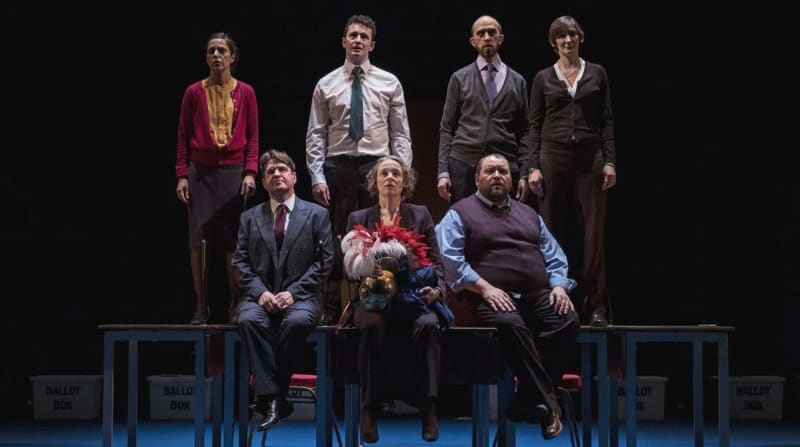Our Country; a work in progress is an experiment in vox pop, in which the voices of real people are placed in the mouths of actors to create a debate about Brexit. Presiding over it all is Britannia (Penny Layden), a proud figure who attempts to carve order out of the vocal chaos.
The debate takes place in a community hall, where a series of old school desks are laid out in a row, international conference style, and occupied by regional representatives. As the debate rages, comments are thrown across the floor by actors in the idiosyncratic style of those who originally voiced them so that, for example, the generously girthed Christian Patterson, who represents Cymry, speaks using the voice and mannerisms of a thirteen-year-old boy from Merthyr Tydfil while Adam Ewan (South West) responds in the style of an eighty-year-old grandmother from Bristol.
Not that the actors are limited by the one voice, indeed each representative captures a diversity of opinions and personalities to create a bubbling cauldron of vocality. Britannia, meanwhile, occasionally interpolates the debate with the voices of leading political figures. Her Boris Johnson is particularly strong: she captures his stuttering, inane style with scarecrow arms that circle as she speaks. (“It’s the biggest stitch-up” he says of the European Union, “since the Bayeux Tapestry.”)
There is a choral quality to the piece at times, and Rufus Norris and Carol Ann Duffy have together wrought a piece that celebrates the inherent musicality of language. The repetitions, contradictions, absurdities and rhythms of speech are exploited by the actors to create performances rather more theatrical, one imagines, than the original. There is a lot of humour here, too: “we heard on the news that terrorists are coming into Wiltshire but I haven’t seen any.”
Once the debate is over, there is a hiatus during which each of the representatives shed their multiple other selves and tuck into something to eat. Here, more than at any other time, they become stereotypical embodiments of their region. The Caledonian representative, for example, becomes fiercely nationalistic and breaks out the whisky. The North Eastern representative, meanwhile, opens a briefcase to reveal her "vegetarian pizza"—chips on pizza. Tension builds as the votes are counted, and each region describes its reaction to the result.
Although deliberately placed in an unremarkable setting, in a room that resembles a community hall, the visuals are likewise a little drab and dingy. One longs sometimes for something a little more stimulating.
Such a robustly political piece inevitably provokes a political reaction. Perhaps because the country voted, overall, for Brexit, the piece heavily emphasizes this side of the debate. Not all regions are represented. London, for example, is conspicuously absent. And perhaps because regionalism (or provincialism) is akin to parochialism, one eventually feels worn down by the intensity and frequency of the parochial thinking espoused. Where were the unashamedly Internationalist voices?
My Country; a work in progress is an interesting and oftentimes absorbing experiment but I sense its voices won’t resound much beyond the walls of its own making.
